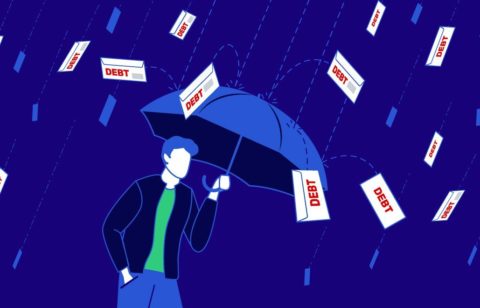Couples in love often end up walking down the aisle and committing to stay together “for richer or for poorer.” But unfortunately, there are instances where one partner decides to hide the truth about their finances from the other.
Deceiving a spouse or romantic partner about some aspect of your financial life is commonly known as “financial infidelity.” A surprisingly high percentage of adults – 32% – admit that they have financially deceived someone with whom they had a relationship and shared finances, according to a recent survey from CreditCards.Com.
The survey also discovered that GenZers and millennials were more likely to lie to their partner about finances compared to GenXers and baby boomers.
According to respondents, reasons for keeping financial secrets include:
- The issue of money never came up: 31%
- Wanting to control their own finances: 30%
- Embarrassed about how they handle money: 25%
- Not trusting partner with finances: 14%
- Addictions: 13%
Both males and females admitted to this behavior. However, a study from the National Endowment for Financial Education (NEFE) found that men were significantly more likely than women — 47% to 39% — to deceive their partner about money issues.
Such deception might seem harmless to some, but it often comes with a high price tag. NEFE discovered that financial infidelity can result in:
- Arguments: 42%
- Loss of trust: 32%
- Limited privacy: 20%
- Separation of shared finances: 16%
- Divorce: 16%
People Also Read
What Is Financial Infidelity?
“Intentionally hiding debt is one common type of financial infidelity,” says Jenny G. Olson, assistant professor of marketing at Indiana University’s Kelley School of Business.
Olson has done extensive research on the topic of financial infidelity. She and colleagues at three other universities published their findings on the subject in “Love, Lies, and Money: Financial Infidelity in Romantic Relationships.” It was billed as the “first systematic investigation of financial infidelity in committed romantic relationships.”
Two main components make up what we commonly think of as financial infidelity, according to Olson:
- You engage in any financial behavior that would likely meet with the disapproval of your significant other. Actions like hiding credit card debt and lying about your income would fall into this category.
- You intentionally fail to disclose this behavior to your partner.
People engage in financial infidelity for all manner of reasons. If your own spending is causing you to fall more deeply into debt, your instinct to hide the bad news from your partner is understandable. Maybe you simply are embarrassed about your behavior. Or perhaps you want to spare your loved one the pain of knowing just how deeply you are in the red.
But hiding the truth from your partner is almost always a mistake. The amount of debt you are hiding can lower a good credit score, which is vital for real estate purchases if you try to buy a home together.
“Financial infidelity has the potential to harm the relationship in a few ways,” Olson warns.
The Damage Financial Infidelity Causes
In the context of a marriage, the two partners are part of an “interdependent union,” Olson says. That means that each time a partner does something, it potentially affects the other person.
In some cases, financial infidelity causes monetary harm to the relationship, such as reducing the couple’s ability to achieve joint financial goals, according to Olson. As you sink more deeply into debt and your personal finances are in disarray, your financial woes can jeopardize visions of owning the home of your dreams or other goals.
According to Olson, “If one partner is concealing debt, it could impair the couple’s ability to save for retirement, vacation, household needs, and more.”
But the damage can also be emotional. When you withhold crucial financial information from your partner and your deceit is later revealed, it results in a violation of trust. As mentioned earlier, 16% of respondents in the NEFE study said financial fidelity led to a separation of finances or even divorce.
Previous studies have found that arguments about money and debt are one of the top reasons for divorce. So, the stakes are high.
Debt And Financial Infidelity
The amount of debt is often a major source of tension in relationships, even when financial infidelity is not involved.
It’s not uncommon for one or both partners to carry debt going into marriage. In most cases, only the individual who incurred the debt is responsible for paying it off—however, there are exceptions. If you co-signed for your partner or opened a joint credit card before marriage, you would become responsible for the debt as well.
Once you are married, the responsibility depends on where you live. If you reside in one of the nine community property states (Arizona, California, Idaho, Louisiana, Nevada, New Mexico, Texas, Washington, and Wisconsin), both spouses are responsible for paying off any debt. In common law states, on the other hand, spouses may share some debts but not others.
While debt woes can create trouble in any relationship, the problem compounds when one person hides information about debt from the other. They may lie about their debt amount, income, number of bank accounts, savings, or spending habits. Engaging in reckless activities like impulsive spending or gambling not only takes a toll on one’s finances but could also destroy relationships or result in divorce.
How To Repair The Damage Of Financial Infidelity
Once financial infidelity occurs, the best you can do is pick up the pieces and try to repair any damage. “You can’t change what has already happened, but you can decide how to move forward, together,” Olson advises.
If you have been guilty of hiding money issues from your partner, the time to end the deception is now. However, it is important not to simply blurt out the truth of what has been happening.
Instead, Olson recommends that you plan ahead and ask your partner to sit down with you to discuss the financial problems you are facing.
“Do not spring this topic on your partner,” she cautions. “Instead, set aside time, sit down together, and discuss in a judgment-free zone.”
Money issues – especially those that revolve around the topic of credit card debt – can be difficult for couples to discuss. “Oftentimes, it’s not about money – it’s about security, stability, and autonomy,” says Olson.
She recommends that couples who are ready to openly discuss their debt situation make an effort to “hold space for each other” and to approach the conversation in a spirit of goodwill.
“Remember that you’re on the same team,” Olson advises. “It’s easy to point fingers and assign blame when one – or both – partners has been acting as an independent agent. But marriage is a union.”
Once you resolve your differences about past deceptions and agree to find debt relief together, the real work begins. Becoming debt free does not happen overnight, but if you attack the problem patiently and methodically, you can achieve your goal.
Options for eliminating your debt include speaking with a financial planner or a nonprofit debt counselor or working with a company such as National Debt Relief to understand how debt relief can work to help you pay off your debt for a fraction of what you owe.
If you continue to struggle with your partner over hidden debt issues, consider reaching out for help to someone in the growing field of financial therapy for couples.
This type of counseling can help couples to focus on the emotions, behaviors, and beliefs surrounding their financial lives, and to learn better ways to communicate about money moving forward.
At National Debt Relief, we take pride in empowering people to regain their financial stability through our proven debt relief program. Contact us and talk to a financial expert who will work with you to find the best option to settle your debt and help you achieve financial independence.









